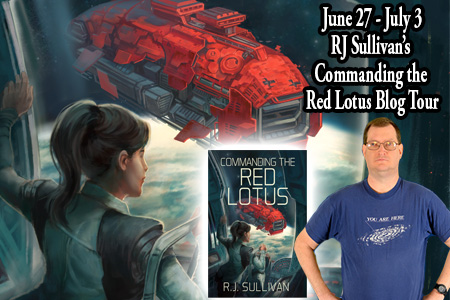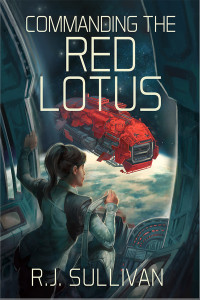R.J. Sullivan's Commanding the Red Lotus Blog Tour!
June 27 to July 3, 2016


About the author: Best known for his ghost story thrillers, Commanding the Red Lotus is R.J.Sullivan’s fifth book and his first release in the genre he most adores. R.J.’s critically acclaimed, loosely connected ghost story trilogy and his short story collection are all available in paperback and ebook though Seventh Star Press. R.J. resides with his family in Heartland Crossing, Indiana. He drinks regularly from a Little Mermaid coffee mug and is man enough to admit it.
Interview:
When
did you first realize you wanted to be a writer?
I
don’t remember ever NOT wanting to be a storyteller of some sort. I used to
draw my own comic books. My best friend and I used to record stories on
cassette tape radio drama style where we did all the voices. Spoofy nonsense
like Star Trek the Comedy (The Enterprise unearths a Rubik’s Cube on an
archeology expedition and Spock immediately gets addicted to trying to solve
it). Comedy gold, as you can tell. We also had our own SF dramas in which we
were grown up and part of the crew of our own spaceship (at the ripe old age of
21 if I recall) fending off an Independence
Day-style alien invasion.
I
also drew my own comic books, with my derivative hero “Fly Man” and scribbled
stories in notebooks throughout my middle-school years. Someday these notebooks
will be found after I have died and I’ll die from embarrassment all over again.
My
high school story efforts earned me praise from my teachers and I won an award.
As any writer will tell you, attention and accolades are the two driving forces
of any writer, and my path was set. I went on to win a similar praise and
awards in college and I was hopelessly committed.
2.
What is your work schedule like when you're writing?
When
I am working on a project, I settle down in front of the computer late morning.
I set a goal of 1K words a day, and take few breaks until I’ve hit that goal.
Maybe an occasional peek at Facebook. Lunch, of course. When I can, I create a
reward for myself for that day. Maybe I have a chocolate bar in the fridge
waiting for me when I type word 1001. Maybe I’m going to watch an episode of a
TV show or a movie.
I also follow advice I first heard by Gary Braunbeck, which is to stop in the middle of a thought, literally leave a sentence dangling, save your draft and stop for the day. When you return, the unfinished thought helps you re-enter “the zone.” It definitely works for me.
I also follow advice I first heard by Gary Braunbeck, which is to stop in the middle of a thought, literally leave a sentence dangling, save your draft and stop for the day. When you return, the unfinished thought helps you re-enter “the zone.” It definitely works for me.
I
use Scrivener software for my writing, which can track daily session counts as and
your overall progress as a pair of handy bar lines. Filling that bar line is
great positive reinforcement.
3.
What would you say is your interesting writing quirk?
I
am not a morning person in general and need my coffee. I have a mug collection
that I started sharing on social media, and my Little Mermaid Mug became the
sort of a breakout star. I now sell my own version of a mermaid mug on my
website using my character Rebecca Burton for the image to avoid pesky lawsuits
by companies with bottomless pockets.
4.
What do you like to do when you're not writing?
I
don’t read as fast as I used to, but I still love to read. I also watch TV and
movies—probably too many. I am a fan of the SF and F genre going back my entire
life. Star Trek and Star Wars were a huge part of my
childhood, and I’m a bit of a classic movie junkie as well. And I love classic
horror movies, Universal and Hammer films, and have a fondness for the cheesy
drive-in fare of the 50s and 60. Svengoolie is now weekly required viewing at
my house. When I was a kid, SF and F films were few and far between and it wasn’t
too tough to stay up on what was current. Now there is so much that I wouldn’t
want to be a person who keeps up with it all—I’d never get anything else done.
5.
What does your family think of your writing?
I
met my wife in a college level SF Literature class. She is an avid reader and
now she edits books for Seventh Star Press and independently. She certainly
knew who she was marrying. J Linda is a
critical reader and in many ways the toughest member of my beta group. She
challenges me on sloppy plot points and forces me to rewrite. When she loves
something, I know it’s pretty solid. I guess I should say that the Red Lotus
stories are her favorite of my work.
The
kids pretty much roll with it. They grew up with my activities in the
background and it’s just a part of things that happen. On occasional weekends
when I am gone at a convention, they can access more of the house and be a bit
louder.
My
extended family is proud and supportive. I am blessed to still have both of my
parents around, and while they don’t strictly get my content, my dad reads all
of it and my mom promotes my books to her friends. My sister-in-law is a reader
and frequently brags about me, so what more can you ask?
6.
What was one of the most surprising things you learned in creating your books?
The
importance of finding good beta readers---that group of people you recruit to
critique your work after you have done everything you can to make a book as
strong as you can. Beta readers should be people who aren’t your family and
don’t love everything you write. They should be challenged to find plot
problems as well as typos, and they should be merciless in reviewing your
manuscript. I have a solid core group that’s great at this, and to be honest,
recruiting a new near-total stranger and maybe dropping people out who become
too much of a fan are good habits to get into. Commanding the Red Lotus had a new beta reader, a friend of my
wife, who challenged me on several levels, and made the book much stronger
because of it. (Hi, Emily)
7.
How many books have you written? Which is your favorite?
Commanding the
Red Lotus
is my fifth book and the first spaceship adventure story I’ve written. I’m
known for my ghost stories, so this was a shift in genre for me, and a chance
to write what I love to read. It wrote easily. I’m not sure I’d call it my
favorite. It’s certainly my favorite this year, lol, but Haunting Obsession has been awfully good to me since 2012.
8.
What do you think makes a good story?
There
are two major elements that all stories have, plot and character. Simply put, a
plot is what happens in the story, and character is how your protagonist (and
those around them) is affected by these events and how they respond. All
stories need both, and in my opinion, a storyteller’s “style” is defined by how
much focus they put on one element over the other.
I
am very much interested in character; my characters drive my stories. Whether
you are reading my ghost stories or my SF, I tend to focus on characters and
dramatize how the events in the story affect and change them. Plot is still a
vital part of the story but it interests me less.
Plot-centric
stories, when handled poorly, can interfere with a naturally growing character
arc. To pick an obvious recent example, Batman
V Superman was full of this problem. The plot pushed characters into acting
in ways unnatural to their tendencies so that the plot could move forward.
Batman, for instance, had no good reason to hate Superman except that he needed
to so the plot could go forward. (Batman blames Superman for the unintended
damage caused while defending Metropolis from the villains who intended to
conquer the world? Really? They writers made the choice to make a character a
willfully stupid idiot in order to progress the plot)
Babylon 5 is another good
example of this. I loved the show overall, but hated how one plot element
interfered with the natural progression of the story. Ambassador Londo is
“possessed” by an alien presence puppet-master style and does things he would
never have done in his right mind. I hated that. Hated every second of how it
played out. It’s a cheap plot device because the character would not have
otherwise been motivated to betray his people.
9.
As a child, what did you want to do when you grew up?

Book Synopsis for Commanding the Red Lotus: Money Can’t Buy Respect Sayuri Arai, privileged daughter of a corporate mogul, abandons a promising career to find her own path. She invests in a broken-down asteroid mining ship and steps in as the commander of its crew. Every day presents a new challenge just to keep her ship from falling apart and the bitter crew from killing each other. Can Sayuri unite the feuding factions, or will her rivals turn the entire complement against her? Commanding the Red Lotus offers a classic sense of wonder for today’s science fiction readers. Volume one of the Red Lotus Stories, now in softcover for the first time. Commanding the Red Lotus includes the previously released ebook novelettes: Fate of the Red Lotus Red Lotus: Innocence Lost Plus the brand-new novella Mutiny on the Red Lotus
Author Links:
Website: https://rjsullivanfiction.com/
Twitter: @RJSullivanAuthr
Facebook: https://www.facebook.com/R.J.SullivanAuthor
Tour Schedule and Activities
6/27/2016 Sheila's Guests and Reviews Guest Post
6/28/2016 Deal Sharing Aunt Interview
6/29/2016 Cover2Cover Guest Post
6/29/2016 I Smell Sheep Guest Post
6/30/2016 Jordan Hirsch Review
7/1/2016 Jorie Loves A Story Guest Feature/Interview
7/2/2016 MyLifeMyBooksMyEscape Interview
7/3/2016 Swillblog Review
7/3 Jorie Loves A Story Interview
Amazon Links for Commanding the Red Lotus Print Version https://www.amazon.com/Commanding-Red-Lotus-R-Sullivan/dp/1941706703
Kindle Version https://www.amazon.com/Commanding-Red-Lotus-Stories-Book-ebook
Barnes and Noble Link for Commanding the Red Lotus: http://www.barnesandnoble.com/w/commanding-the-red-lotus-rj-sullivan/1123735230?ean=9781941706701
No comments:
Post a Comment